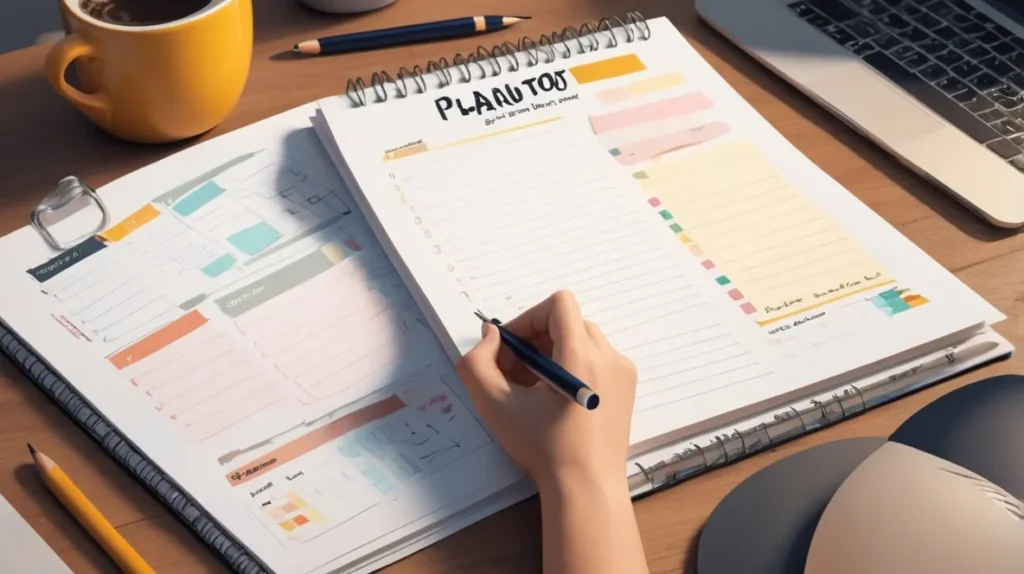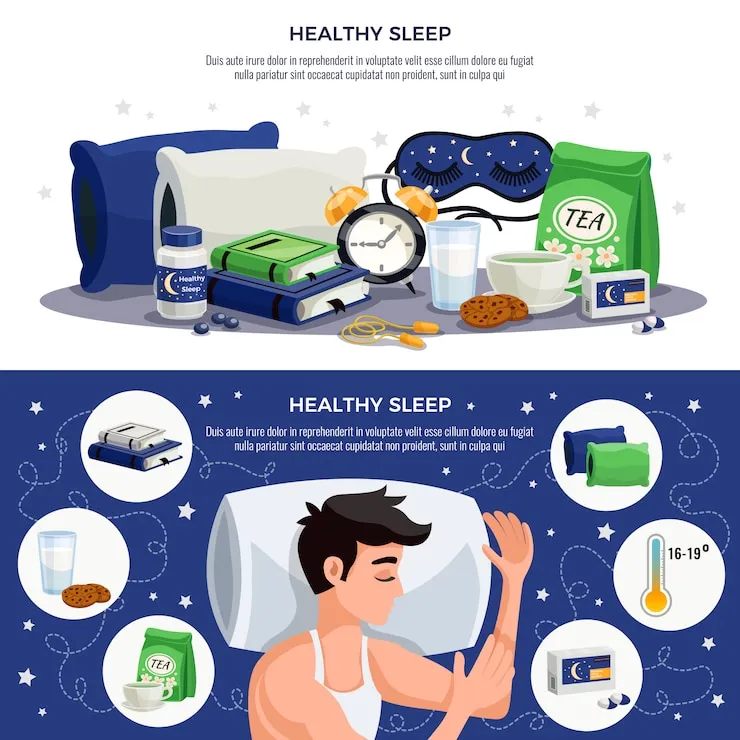Did you ever wonder why some pupils just sail through their school work and others struggle to catch up? The answer is often hidden in theTop 10 Smart Daily Routine for Students. Developing a sound routine is not merely about discipline — it’s about establishing a lifestyle conducive to learning, wellness, and lasting achievement. In this article, we will explore the top 10 daily routines smart pupils employ to stay ahead of the class, sharp, and full of energy.
Table of Contents
Toggle1. Wake Up Early and Start Your Day Right

It’s not necessary to be a morning person to wake up early. It provides you with an early start — peaceful time to think, reflect, and get ready. Early risers tend to have clearer thinking and less stress caused by hurrying. Attempt beginning your day with water and some gentle stretching to wake yourself up.
Waking up early sets a positive tone. It gives you quiet time for self-care and planning. Here’s how waking up early affects your day:
| Benefit | Description | Suggested Time |
|---|---|---|
| Improved Focus | Early hours are usually quieter and less distracting. | 5:30 AM – 7:00 AM |
| More Time to Plan | Extra time to review goals or exercise. | 15-30 minutes |
| Reduced Stress | No rushing = calm start to the day. | N/A |
Morning Routine Example:
| Activity | Duration | Purpose |
|---|---|---|
| Hydrate (water) | 5 minutes | Rehydrate body after sleep |
| Stretching or Light Exercise | 10 minutes | Wake up muscles and mind |
| Planning To-Do List | 10 minutes | Set daily goals |
2. Plan Your Day with a To-Do List

Nothing is more satisfying than checking off items from a to-do list. Having a written list of daily goals clues your brain into what’s what. Put the urgent stuff first, the critical stuff next, and be realistic about what you can get done. Digital apps such as Todoist or old-fashioned pen and paper do the trick.
Planning keeps your tasks organized and in check
| Planning Tool | Pros | Cons |
|---|---|---|
| Paper Planner | Tangible, reduces screen time | Can be lost or damaged |
| Digital Apps (Todoist, Trello) | Sync across devices, reminders | Requires device access |
| Bullet Journal | Customizable, creative outlet | Time-consuming to set up |
Sample To-Do List Priority:
| Priority | Task | Estimated Time | Notes |
|---|---|---|---|
| High | Finish math assignment | 1 hour | Due tomorrow |
| Medium | Review biology notes | 30 minutes | Prepare for quiz |
| Low | Organize desk | 15 minutes | Keeps study space tidy |
3. Prioritize Important Tasks First

Ever heard the expression “Eat that frog”? It refers to getting your toughest or most critical task done early. Doing so avoids procrastination and generates momentum throughout the day. If your most challenging work is done, then all the other tasks seem easier.
Prioritization tactics can maximize output.
| Method | Description | When to Use |
|---|---|---|
| Eisenhower Matrix | Classify tasks by urgency and importance | When juggling many tasks |
| Eat That Frog | Do hardest task first | To overcome procrastination |
| ABC Method | Label tasks A (most important) to C (least) | Daily task managemen |
4. Take Frequent Breaks to Refuel

Boring for hours straight can sap your brain of energy quicker than you know. Employing strategies such as the Pomodoro technique—25 minutes of task work and 5 minutes of break time—can highly enhance your concentration and memory. During breaks, move away from computers and phones, stretch, or take deep breaths.
Breaks have been proven to increase productivity and creativity.
| Break Technique | Work Time | Break Time | Best For |
|---|---|---|---|
| Pomodoro | 25 minutes | 5 minutes | Deep focus, short tasks |
| 52/17 Method | 52 minutes | 17 minutes | Longer work periods |
| 90-Minute Cycle | 90 minutes | 20 minutes | Aligns with natural rhythms |
Break Activities:
- Stretching
- Walking
- Deep breathing exercises
- Hydration
5.Engage in Physical Exercise Every Day

Your brain is associated with your body, so keeping your body active also improves your brain power. Even 20 minutes of yoga or brisk walking can enhance memory, reduce anxiety, and raise energy levels. Don’t assume you need a gym; simple home workout suits the bill.
Physical activity enhances memory and mental clarity.
| Exercise Type | Duration | Benefits | Example Activity |
|---|---|---|---|
| Aerobic | 20-30 minutes | Increases oxygen flow | Brisk walking, jogging |
| Strength Training | 15-20 minutes | Improves muscle strength | Bodyweight exercises |
| Flexibility & Balance | 10-15 minutes | Reduces injury risk | Yoga, stretching |
6. Practice Mindfulness or Meditation

Mindfulness keeps students in the moment, cutting down on anxiety and improving concentration. Five minutes of daily meditation can clear away mental clutter. Guided sessions are available on apps such as Headspace or Calm, but simply sitting and focusing on your breathing is fine too.
Mindfulness improves attention and emotional control.
| Meditation Type | Duration | Benefit | How to Practice |
|---|---|---|---|
| Focused Attention | 5-10 minutes | Boosts concentration | Focus on breath |
| Body Scan | 10 minutes | Increases body awareness | Scan from toes to head |
| Guided Meditation | 10-15 minutes | Reduces stress | Use apps like Calm |
7. Have a Healthy Diet

Your brain runs on nutrients, so feeding it right is crucial. Foods rich in omega-3 (like fish), antioxidants (berries), and proteins (nuts, eggs) help memory and focus. Staying hydrated also keeps fatigue at bay. If budget is tight, prioritize simple whole foods over processed snacks.
Mindfulness enhances attention and emotional regulation.
| Food Group | Benefits | Examples |
|---|---|---|
| Omega-3 Fatty Acids | Enhance memory and cognition | Fish, flaxseeds, walnuts |
| Antioxidants | Fight inflammation and oxidative stress | Berries, dark chocolate |
| Protein | Supports neurotransmitter production | Eggs, nuts, beans |
| Complex Carbs | Provide steady energy | Whole grains, vegetables |
8. Limit Distractions, Especially Digital Ones

Smart students know the struggle of digital distractions—notifications, social media, and endless tabs. Tools like website blockers or putting your phone on Do Not Disturb mode during study time can help. Create a dedicated study space free of distractions.
Distractions reduce study efficiency drastically.
| Distraction Type | Impact | Countermeasure |
|---|---|---|
| Phone Notifications | Interrupt focus repeatedly | Use Do Not Disturb mode |
| Social Media | Time sink, reduces attention span | Block apps during study |
| Cluttered Workspace | Visual distraction | Keep space tidy |
9. Review and Reflect on Your Day

Spending 10 minutes in the evening thinking about what you got done allows you to learn from errors and win. Writing down what you are thinking or checking your list of things to do prepares your mind for tomorrow and keeps you stress-free.
Reflection supports learning and growt
| Reflection Method | Time Needed | Purpose | Example Questions |
|---|---|---|---|
| Journaling | 10 minutes | Track progress and feelings | What worked well today? |
| To-Do List Review | 5 minutes | Assess task completion | What did I miss? |
| Goal Adjustment | 10 minutes | Plan improvements | What can I improve tomorrow? |
10. Get Quality Sleep Every Night

All the productivity hacks won’t help if you’re sleep-deprived. Aim for 7-9 hours of quality sleep to solidify memory and rejuvenate your body. Avoid screens an hour before bed, keep your room cool and dark, and maintain a consistent sleep schedule.
Sleep is critical for memory and overall health.
| Sleep Hygiene Habit | Purpose | Tips |
|---|---|---|
| Consistent Schedule | Regulates body clock | Go to bed and wake up same time daily |
| Screen-Free Hour | Helps melatonin production | Avoid devices before sleep |
| Comfortable Environment | Promotes deep sleep | Cool, dark, and quiet room |
Summary Table: Top 10 Smart Daily Habits
| Habit | Suggested Time | Key Benefit | Quick Tip |
|---|---|---|---|
| Wake Up Early | 5:30 – 7:00 AM | Better focus, calm mornings | Hydrate first thing |
| Plan with To-Do List | Morning | Organized day | Prioritize tasks |
| Prioritize Tasks First | Morning | Beat procrastination | Eat the frog |
| Take Regular Breaks | Every 25-50 mins | Sustained productivity | Use Pomodoro timer |
| Exercise Daily | 20-30 minutes | Brain boost | Try home workouts |
| Practice Mindfulness | 5-15 minutes daily | Reduce stress, improve focus | Use guided apps |
| Healthy Diet | Throughout the day | Enhance energy and memory | Choose whole foods |
| Limit Distractions | During study sessions | Stay focused | Phone on Do Not Disturb |
| Reflect on Your Day | Night | Track growth and plan ahead | Journal or review to-do list |
| Get Quality Sleep | 7-9 hours per night | Memory and health | No screens before bed |
Incorporate Effective Time Blocking
One of the smartest ways to boost your productivity as a student is by practicing time blocking. This technique involves assigning specific chunks of time to particular tasks or activities throughout your day. Instead of multitasking or working without structure, time blocking allows you to focus intensely on one thing at a time, helping you avoid distractions and stay organized. For example, dedicating 9-10 AM exclusively to studying math and then 10-11 AM for reading keeps your day balanced and purposeful. This method not only increases your efficiency but also helps reduce the feeling of overwhelm, which often comes from juggling multiple tasks all at once.
Use Visual Study Aids
Visual tools like mind maps, flashcards, and charts can transform the way you learn by engaging different parts of your brain. Instead of passively reading or listening, these aids encourage active learning. For instance, mind maps help you connect ideas visually, making complex topics easier to understand and remember. Flashcards promote active recall, which strengthens memory by forcing you to retrieve information rather than just recognize it. Using diagrams to break down processes can simplify difficult subjects and make studying less intimidating. Incorporating these into your daily routine adds variety and makes study sessions more interactive and effective.
Connect with a Study Group or Partner
Studying alone can sometimes feel isolating or draining, but working with a study group or partner adds accountability and motivation. When you study together, you get to hear different viewpoints, which can deepen your understanding of the material. Group study sessions every day remind you to be consistent and even make the most boring subjects interesting. In addition, socialization during breaks from studying can ease fatigue. To maximize group study, keep sessions short, choose serious and dedicated classmates, and establish concrete objectives for each session to avoid wasting time.
Limit Caffeine Intake
While it might be tempting to rely heavily on coffee or energy drinks to stay awake and alert during long study sessions, too much caffeine can backfire. Overconsumption often leads to jitters, anxiety, and difficulty sleeping, all of which harm your focus and performance. Experts recommend limiting caffeine to about 200-300 mg a day (roughly two to three cups of coffee). To maintain steady energy levels, try replacing some caffeinated beverages with herbal teas or simply water infused with fruits like lemon or cucumber. Staying hydrated and avoiding caffeine overload keeps your mind clear and your body balanced throughout the day.
Keep Your Study Space Organized

An often overlooked but crucial part of an effective daily routine is having an organized and inviting study environment. A cluttered desk or poorly lit room can drain your motivation and distract your focus. By dedicating just a few minutes each day to tidy your space, you reduce visual chaos and create a more peaceful atmosphere that invites concentration. Proper lighting helps prevent eye strain, and adding personal touches like plants or inspirational quotes can make your study area feel welcoming. When your space feels good, sitting down to study becomes easier — almost like a reward in itself.
Handle Unexpected Disruptions Gracefully
No matter how well you plan, unexpected events or interruptions can throw off your routine. The key is to build flexibility into your schedule and accept that some days won’t go perfectly. Having buffer time in your day allows you to catch up without stress. Juggle must-do’s with compassion to yourself if you must move less important ones to the next day. Don’t forget, routines are in place to help you achieve your objectives, not to confine you. The skill of flexibility without losing sight of your larger picture is one that will benefit you for many years to come.
Extended Daily Routine Sample
To give you a clearer picture, imagine waking up at 6 AM and starting your day with hydration and stretching. After a short mindfulness session to center your thoughts, you enjoy a balanced breakfast. You spend the morning tackling your highest-priority tasks using focused study blocks with regular breaks in between. Physical activity and social study sessions pepper your afternoon, ensuring your mind and body stay energized. Evenings are reserved for lighter work, hobbies, and a healthy dinner before winding down for restful sleep. This balanced approach not only maximizes your productivity but also maintains your well-being.
Conclusion
Building a smart daily routine tailored to your lifestyle is one of the best investments you can make as a student. It’s not about perfection but consistency, flexibility, and self-awareness. Use the tables and strategies shared here as a blueprint to craft your own routine that balances productivity with well-being. Start small, stay committed, and watch your academic and personal growth soar!
FAQs
1. Can routines help reduce exam stress?
Yes! Structured routines reduce uncertainty and help you manage study loads efficiently, lowering anxiety.
2. How can I stay motivated to keep a routine?
Set small goals, celebrate wins, and remind yourself why the routine matters.
3. What if I’m more productive at night?
Adjust your routine to fit your natural energy peaks but still aim for consistent sleep.
4. How important is hydration during study?
Very important! Dehydration can cause tiredness and reduce focus.
5. Can group study fit into a daily routine?
Absolutely. Schedule group sessions during times when you need motivation or collaboration.











